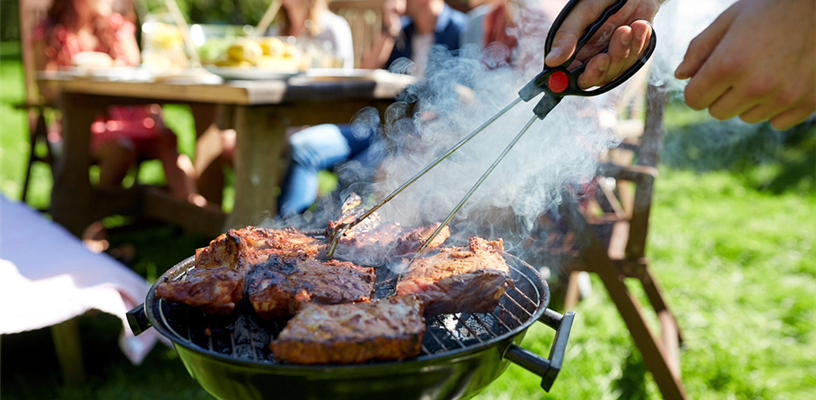
- By Sarah Frantz, MPH, CHES
- Posted Monday, June 12, 2017
Grill Smart This Summer
Be Food Safe & Grill Smart This Summer!
With warmer weather and longer days making their appearance many people are starting to enjoy more time outdoors. This includes spending a lot of time cooking and eating outside. The Environmental Health Division of Forsyth County Department of Public Health wants to make sure everyone is equipped to grill smart this summer.
Tip #1: Keep your workspaces and hands clean in order to stop germs from contaminating your food. Dirty hands and prep surfaces can carry germs. Wash hands, kitchen and grilling utensils, cutting boards, and kitchen surfaces immediately with soap and water after they have come in contact with raw meat and poultry. Keep your thermometers clean with soap and water.
Tip #2: Don’t let your cooked food and raw food mingle. Raw food juices can contaminate cooked food and cause foodborne illnesses. Keep raw meats on a plate away from cooked meats, which should be placed on a separate, clean plate after they have been cooked. If you have marinated meats in a bag or dish, discard the marinade immediately. Do not place cooked meats in a marinating dish or back in the marinating liquid.
Tip #3: Check your meat temperature. Meat liquids may turn brown but that does not mean they are fully cooked to a safe temperature. Just because food looks cooked, does not mean that it is fully cooked. Use a clean meat thermometer on grilled and smoked meats to check their inside temperature. The chart below indicates the recommended internal temperatures for eliminating harmful bacteria and germs inside meats.
Keep It Safe: Cook to Correct Temperatures
Grilling: 145*F - Whole cuts of beef, pork, lamb, and veal. Hold the internal temperature of the meat at 145*F for at least 3 minutes.
145*F - Fish
160*F - Hamburgers and other ground beef
165*F - All poultry and pre-cooked meats, such as hot dogs or sausages.
After Grilling: 140*F + Keep food at 140*F or warmer until it is served.
Tip #4: Treat your leftovers right! Leaving the leftovers out in warm temperatures for an extended period of time allows germs to grow and can cause foodborne illnesses. Refrigerate leftover meats within two hours of cooking. If you are outside and the temperature is over 90*F, refrigerate leftover meats within one hour of cooking. When cooling a large quantity of leftover food, make sure to divide it into shallow containers for faster cooling in the refrigerator or freezer. Always reheat leftovers to 165*F or higher before serving or eating.
Tip #5: Plan ahead on cooking your food safely. Food poisoning can peak in the warmer months because warmer weather allows bacteria and other foodborne germs to grow better than it would in colder weather. Always check for foods on the recall list when you are planning your BBQ or cookout. Do not serve foods that are on the recall list, and if you have already purchased an item on the list, discard them immediately.
Tip #6: Make sure you keep your grill clean. Using hard wire brushes to clean the grill can cause pieces of wire to break off the brush and stick to the grill grates The wire can then get stuck in food and cause many health issues when accidentally eaten. Use a moist paper towel or cloth to clean the grill surface before placing food on it. Inspect the grilling surface for broken wire bristles if you are using a wire brush to clean. Grill safely this summer! If you need more information or resources, please visit us online at www/forsyth.cc/publichealth/environmentalhealth.
To check the current recalled foods list, visit www.foodsafety.gov/recalls/recent/index.html.






